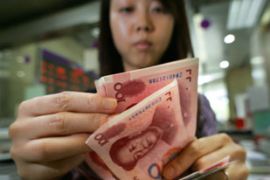US reassures China over assets
Chinese premier questions security of its US bond investments.

China is the biggest holder of US government debt and has invested an estimated 70 per cent of its $2 trillion stockpile of foreign exchange reserves, the world’s largest, in dollar assets.
“We have lent a massive amount of capital to the United States, and of course we are concerned about the security of our assets,” Wen said.
“To speak truthfully, I do indeed have some worries … I would like, through you, to once again request America to maintain their creditworthiness, keep their promise and guarantee the safety of Chinese assets.”
China concerns
Hillary Clinton, the US secretary of state, during her visit to Beijing in February, urged China to keep investing in US assets, and said any big switch by Beijing out of US treasury bonds would drive prices lower, inflicting the very losses Wen fears.
| In depth |
  China aid plan for jobless migrants China aid plan for jobless migrants China’s priorities: Key quotes China’s priorities: Key quotes  Video: China’s job crisis Video: China’s job crisis |
Thomas Palley, the former chief economist for the US-China economic and security review committee, told Al Jazeera that there was a political and economic dimension to Wen’s announcement.
“The political aspect is to speak within China to the nationalists, the more hardline constituency, and show that China won’t be pushed around on this issue and China is concerned about it.
“The economic dimension is to try to deter American policymakers from taking any strong action to correct the trade imbalance, and particularly the exchange rate problem.”
Philip Bowring, a Hong Kong-based commentator on Asia, said that China could have avoided investing so heavily in US treasuries if they had adopted a different approach to growth.
“China did have a choice of whether they continued their export-driven growth – focused, often very heavily, on the United States – or being more domestically focused, which would have meant they would have grown almost as fast, but wouldn’t have accumulated a large amount of US treasuries,” he told Al Jazeera.
“Naturally they feel a little bit nervous about [holding US treasuries] because it’s not that they’re illiquid, but the conditions under which China can actually sell them are rather limited and the yield on these treasuries is low and tending to decline.”
‘Enough ammunition’
Despite his concerns over US treasuries, Wen expressed confidence the economic recovery plan of President Obama.
Wen, who took questions for over two hours, also used the news conference to further detail China’s own four trillion yuan ($585bn) stimulus package.
 |
| Wen voiced concern over the outlook of US government bonds [Reuters] |
He had disappointed investors in his annual report to parliament a week earlier by failing to announce an increase in the size of the package, which aims to boost domestic demand and so take up the slack left by a sharp drop in exports.
China has reported a record decline in exports in February and record-low industrial production growth in the first two months of the year.
Wen reiterated his warning, made to the National People’s Congress (NPC), China’s rubber-stamp parliament, last week, that 2009 would be a challenging year for China.
But he said that the government had “prepared enough ‘ammunition’ and we can launch new economic stimulus policies at any time”.
Wen said the central government share of the already-announced $586bn stimulus plan would be used in “projects for public welfare, technological innovation, environmental protection and infrastructure projects”.
With the bulk of that money already allocated in the government budget, he said he was convinced that recovery was within sight.
The stimulus plan also gives a strong boost to social welfare spending, which the government hopes will boost domestic consumption by encouraging Chinese, who typically save about 20 per cent of their income, to spend more.